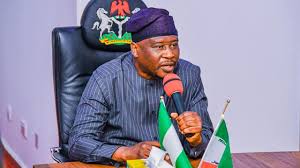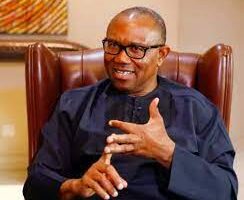None of the local and foreign observers accredited for the 2023 General Election deployed an adequate number of persons to cover up to 10 per cent (17,661) of the 176,606 polling units across the country used for the exercise, thus putting a big question mark on the reliability, objectivity, and accuracy of their assessments, Blueprint has authoritatively gathered.
Checks on figures obtained by our reporter showed 190 local and 34 foreign observer groups that applied were accredited by the Independent National Electoral Commission (INEC) to observe the 2023 General Election.
EU-EOM’s position
EU Chief Observer Barry Andrews had in a report, faulted INEC for the operational challenges and glitches experienced with the bimodal voter accreditation system (BVAS) and the result viewing portal.
He said the discrepancies severely damaged public confidence in the electoral body, adding that the report was based on the analysis of compliance with Nigeria’s regional and international commitments for democratic elections.
Contrary findings
However, our findings on deployment statistics revealed that the observer groups did not make adequate provisions for personnel to cover the grounds in each of the 36 States and the Federal Capital Territory (FCT).
While only a handful of the groups sent a very limited number of observers to the 36 states and the FCT, the majority could only cover a few states, with many deploying as little as one observer to a state.
From INEC records, “the Commission conducted the elections in 176, 606 Polling Units spread across 8,809 Wards in 774 Local Government Areas, domiciled in 36 States and the FCT. According to political science experts, to derive an objective and near-accurate assessment of such a massive exercise, an Observer Group should adequately cover at least 60 per cent of the total polling units across the country, translating to 105,963 PUs.”
“However, while some of the Observers sent a disproportionate number of Observers to the FCT, Lagos and Delta States, many of them deployed a limited number of Observers to States with security issues. The figures obtained were contained in the observer groups’ submissions to INEC, but it is not clear if the actual number of observers deployed for the election conforms with their various submissions.
“For instance, YIAGA Africa purportedly deployed 5,676 observers across the 36 states and the FCT. Specifically, while it sent 1027 observers to the FCT, which has 2,822 Polling Units (PUs), only 469 observers were deployed to Kano state with 11,222 PUs; 425 observers went to Delta state with 5,863 PUs; 258 observers covered Lagos with 13,325 PUs; 117 observers were deployed to Anambra with 5,720 PUs, while only 110 observers went to Niger with 4,950 PUs.
“The Centre for Democracy and Development (CDD) purportedly deployed 5,345 Observers to the 36 states and the FCT. Instructively, 168 observers were sent to Benue State with 5,102 PUs; 124 to Imo State (4,758 PUs); 98 to Ondo State (3,933 PUs); 84 to Taraba State (3,597 PUs), 73 to Zamfara State (3,529 PUs) and 78 to Kebbi State (3,743 PUs),” our findings further revealed.
It was also learnt that “the Nigerian Civil Society Situation Room/Policy and Legal Advocacy Centre presumably deployed only 2,410 observers nationwide, out of which 101 observers went to Oyo State with 6,390 PUs; 102 to Katsina State (6652 PUs); 63 to Adamawa State (4,104 PUs); 72 to Rivers (6,866 PUs); 50 to Plateau State (4,989 PUs) and 80 to Kogi State (3,508 PUs) among others.
“The Cardinal Onaiyekan Foundation deployed just 92 Observers to 30 States, which include three Observers each to Lagos, Nasarawa, Niger, Sokoto, Taraba, Enugu, and Abia States; and one observer each to Akwa Ibom, Anambra, Bauchi, Benue, Imo, Ondo, and Rivers States.
“On its part, ActionAid sent 700 observers to 17 States, including 103 to Enugu State; 118 to the FCT; 84 to Kano State; 14 to Niger State; 74 to Rivers State, 1 to Imo State, 108 to Lagos State and 15 to Yobe State.
“The Civil Society Legislative Advocacy Centre (CISLAC) deployed 190 observers to 15 States, including 30 each to Benue and Borno States; 25 to Kaduna State; and one each to Cross River, Delta, Gombe, Katsina, Kebbi, Kogi, and Plateau States.
“It’s the same story for international Observers. The European Election Union Observation Mission (EU-EOM) could only muster 172 observers for the 36 States and the FCT. While it sent the highest number of observers – 74 – to the FCT alone, 16 observers were deployed to Lagos State; and 8 each were sent to Kano and Plateau States. Only one observer each went to Kebbi, Kogi, Ogun, Ondo, Taraba, Yobe and Zamfara States, among others.
“The International Republican Institute (IRI) assigned 50 Observers to 10 States, with 41 of them covering the FCT alone with the remaining nine sent to nine States – Adamawa, Delta, Ebonyi, Imo, Kaduna, Kano, Ondo, Osun, and Plateau States.
“Also, the National Democratic Institute (NDI) deployed 100 observers to 11 States, with 89 or 89 per cent of the total number covering the FCT alone. The ECOWAS Mission engaged 284 Observers for 31 States, 75 of which covered the FCT, 27 went to Lagos State; 21 to Kano State; 7 to Niger States, and three each to Abia, Cross River, Ebonyi, Imo and Osun States among others.”
“The implication is that no observer group can authoritatively produce an overall accurate and objective assessment of the 2023 General Election. Nigeria is vast and massive geographically. Therefore, for the 2023 General Election, the best thing is for each observer group to produce its Report based only on the areas that it covered and do so fairly. Doing otherwise would amount to a conjecture and outright dishonesty. But what we have seen is that every observer group is now making definitive statements as if it covered the entire country, which is really not the case. This is quite sad,” said a source privy to the workings of the polls.
“Interestingly, the Nigeria Civil Society Situation Room, which deployed about half of the number of observers deployed by YIAGA and the CDD, has curiously been more vocal about the election than everybody else. It has made several statements about the elections, which gave the impression that it adequately covered the entire country when it did not,” the source further added.
Situation Room
Presenting its report recently in Abuja, the Situation Room had specifically asked the INEC Chairman, Prof. Mahmood Yakubu, to apologise to the country for conducting what it described as a “flawed” election.
Also, the Situation Room, in a statement, claimed to have conducted a post-election survey without providing the details, a development that “exposed a significant dip in citizens’ confidence in the Independent National Electoral Commission.”
It added: “In the light of the upcoming off-cycle governorship elections in Kogi, Imo and Bayelsa in November 2023, the Situation Room is worried about the credibility of INEC and its ability to conduct free elections in the light of the shortcomings experienced during the general elections of February and March 2023.”
The Situation Room also questioned INEC’s ability to conduct the Imo, Bayelsa and Kogi off-cycle governorship elections scheduled for 11th November, asking President Bola Ahmed Tinubu to institute a Panel of Enquiry to investigate how the Commission conducted what it described as a “flawed presidential election.”
However, the statement said: “(The) Situation Room is not in any way tying its call to the outcome of the 2023 General Elections.”
Counter position
Countering the position however, Chairman Partners for Electoral Reforms Ezenwa Nwagwu had insisted the idea that the INEC chairman should apologise to Nigerians was not part of the Report jointly agreed upon.
Nwagwu had openly spoken at the venue of the event where the Situation Room Report was unveiled, just as he rejected the position that nothing good came out of the 2023 General Election.
Rather, Nwagwu said amid several challenges, the Yakubu-led INEC did everything possible to conduct the election as scheduled to avoid postponements that characterised the 2011, 2015 and 2019 polls.
Some of the challenges, according to Nwagwu, include shortage of cash occasioned by the Central Bank of Nigeria’s policy of “re-colouring” the naira, acute fuel shortages, the insecurity in some parts of the country, and the perennial problem of logistics.
Nwagwu had also contended that several factors underscored the election’s credibility despite the myriad of challenges.
For instance, he said Tinubu lost the presidential election in his strongest base– Lagos – while the national chairman of the ruling party also lost his Constituency, just as many governors lost their bids for the Senate.
“I’m not saying that there were no issues. An election is not a church service. The election is a competitive enterprise. We give comfort to the real people who cause challenges in the election. INEC does not cause voter suppression. Politicians do, in collaboration with disgruntled INEC officials. INEC does not unleash violence; politicians unleash violence and their political parties.
“Now, 90 per cent of the time, in discussing the 2023 election, you focus on INEC, and you leave the role of security agents. You leave the role of the political parties and their candidates and the role they play in making bad elections. INEC will bring its ballot box. INEC officials were killed in the 2023 election. They are Nigerians. INEC officials were kidnapped. By whom? Who kidnapped them? Who murdered them? We provide comfort for the political class and their inability to embrace reforms and conduct themselves in a manner that allows for free and fair elections.
“So, I’m not saying there were no issues, and nobody can say that. But I am more interested in the positives. Those who criticise, when you say INEC said it would upload results in real-time, and it didn’t do so; I am saying that you are dealing with a moral issue. It has nothing to do with the law. Because the law has been satisfied when collation and announcements have been concluded,” the election expert had further argued.




